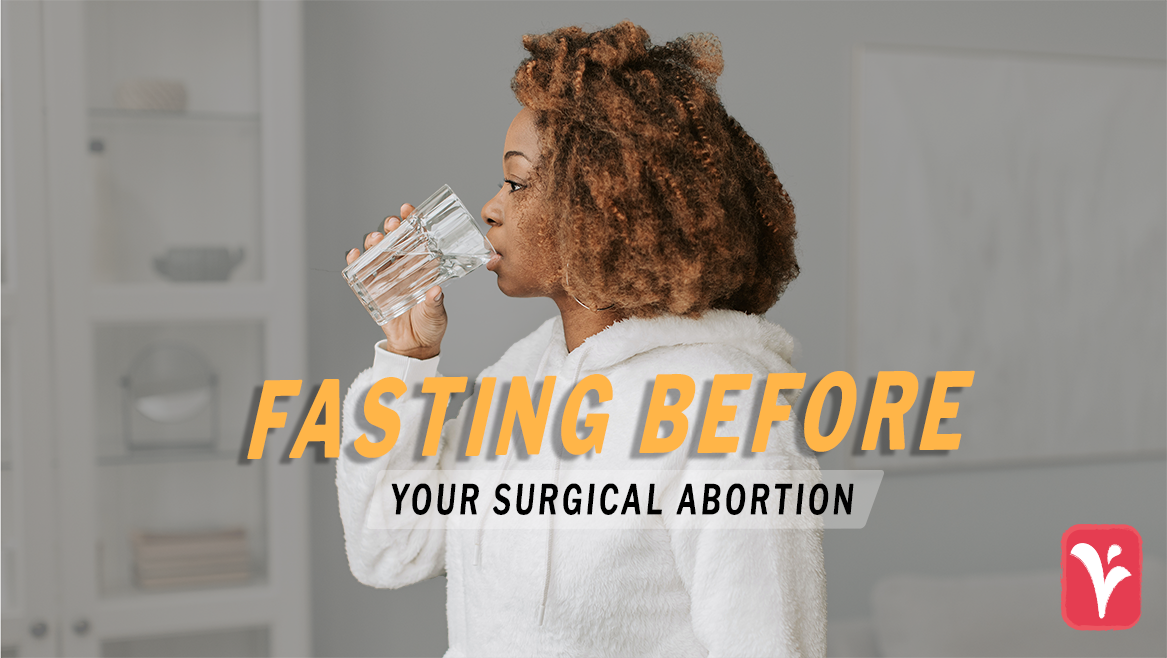At Austin Women’s Health Center, we want to make sure you stay informed during your visit with us. During your initial consultation before an abortion, we provide a lot of information to you, and that may feel overwhelming, especially when added to the stress of navigating abortion access in Texas. Because of this, we want to address a topic that is especially important when it comes to abortion care at our clinic: fasting before your surgical abortion.
What is Fasting?
Fasting means avoiding liquids (drinks) and solids (food) for a specific period of time. At Austin Women’s Health Center, we advise you not to drink for three hours before your scheduled surgical abortion, and not to eat for six hours before your surgical abortion.
What Does Fasting Include?
When it comes to fasting before medical procedures, it’s important to know exactly what’s considered a solid or liquid. Avoid all foods and beverages while fasting, and keep in mind that things like coffee creamer and some energy drinks may contain dairy products that constitute them as both a solid and liquids. Blended foods are also considered a solid, and so is chewing gum—even if you don’t swallow it. Fasting requires you to completely avoid any solids or liquids, so even a few sips or bites of anything are not permitted during these specific timeframes.
In addition to an overall restriction on solids and liquids, here is a list of food and beverages you should also avoid while fasting:
Solids (avoid six hours before)
- All solid foods (fruit, toast, eggs, bacon, oatmeal, pizza, sandwiches, salad, soup, apple sauce, yogurt, etc.).
- Swallowed gum
- Smoothies (blended fruit is still considered a solid).
- Protein drinks, some energy drinks, coffee creamer (liquids that include milk or milk proteins are still considered a solid).
- Saltine crackers or bread (these may seem “safe” as they are plain, but are still considered a solid).
Liquids (avoid three hours before)
- Water (including flavored water or seltzer).
- Juice.
- Coffee/tea (even without creamer).
- Energy drinks or shots.
- Soda.
Why is Fasting Important?
Fasting before certain medical procedures is important because there’s a risk of complications — especially if you’re using Valium or conscious IV sedation to manage anxiety and/or discomfort. Even though a surgical abortion isn’t really a surgery (no incisions or cuts are made), when anesthesia medications are used there’s a risk of aspiration, or fluid in your lungs, because the muscles we use to cough when we need to are paralyzed to some degree. Our saliva and the food and liquids in our stomach can contribute to aspiration, which is why it’s important to undergo certain procedures on an empty stomach. While aspirating is most common under general anesthesia, it’s still a risk with other sedation measures, too.
Even if you’re not using sedation, fasting is still important if you’re having a surgical abortion. Vomiting after certain medical procedures can occur, and although we provide anti-nausea medication before your surgical abortion, the best way to prevent post-operative vomiting is by fasting beforehand. It’s also important to have an empty stomach should any rare complications occur.
Eating a large meal the night before your procedure may negate the impact of fasting since it takes our body longer to digest, so avoid intentionally eating more in anticipation of fasting. Once your procedure is over, we’ll have snacks and drinks in our recovery room that you’ll be able to consume right away.
We know many of you are experiencing uncomfortable pregnancy symptoms like nausea and vomiting, which may lessen with certain foods. Surgical abortion patients will always receive medication to pretreat possible symptoms—including anti-nausea medication—prior to their procedure, but we also prepare you to expect to spend three to five hours at our clinic on the day of your abortion, so if you experience extreme nausea or vomiting at any point, please let us know if you need it beforehand. We also know it can be intimidating to be required to take medication on an empty stomach while experiencing nausea, so you can speak with staff regarding what pre-surgical medications may be optional. Keep in mind that regardless of pregnancy-related nausea and vomiting, there are no exceptions to fasting. If you have a health condition that requires specific food consumption, like diabetes, speak with our medical staff at your initial consultation.
What Happens If You Eat Before An Abortion?
Not fasting before your surgical appointment can not only delay your appointment by hours, but you could be at risk of needing to reschedule altogether. It’s important to be open with our staff about anything you’ve consumed within the fasting time frame as it can have negative outcomes on your health during or after the procedure. At Austin Women’s Health Center, your health is our top priority, and we care about your safety as much as we care about you being able to access a safe abortion.
If you’re not fasting because you’re having a medical abortion, ultrasound visit, or gynecology service, consider others who are unable to eat by discreetly consuming snacks or eating them outside. We have a patio and picnic table area you are welcome to use during your visit. You can also check out our pre-abortion care page for more tips!
